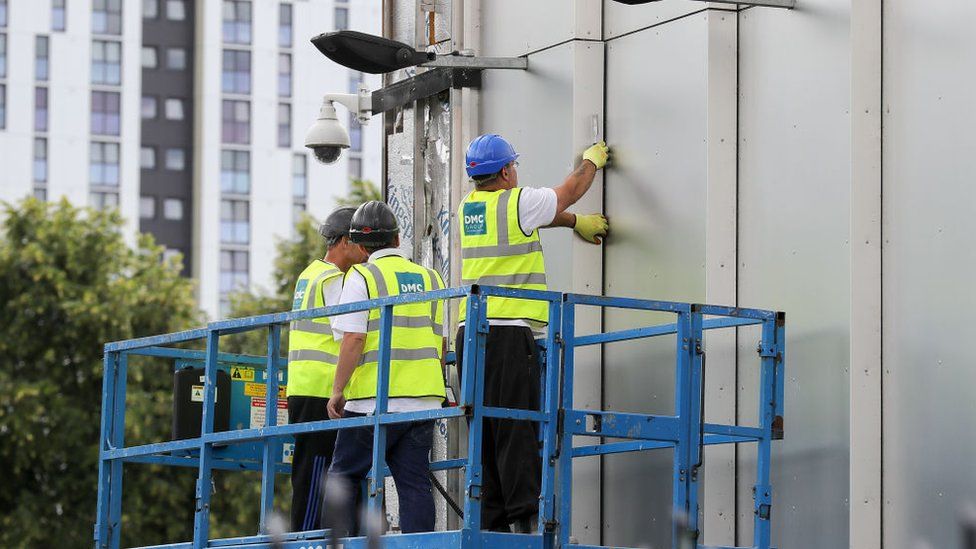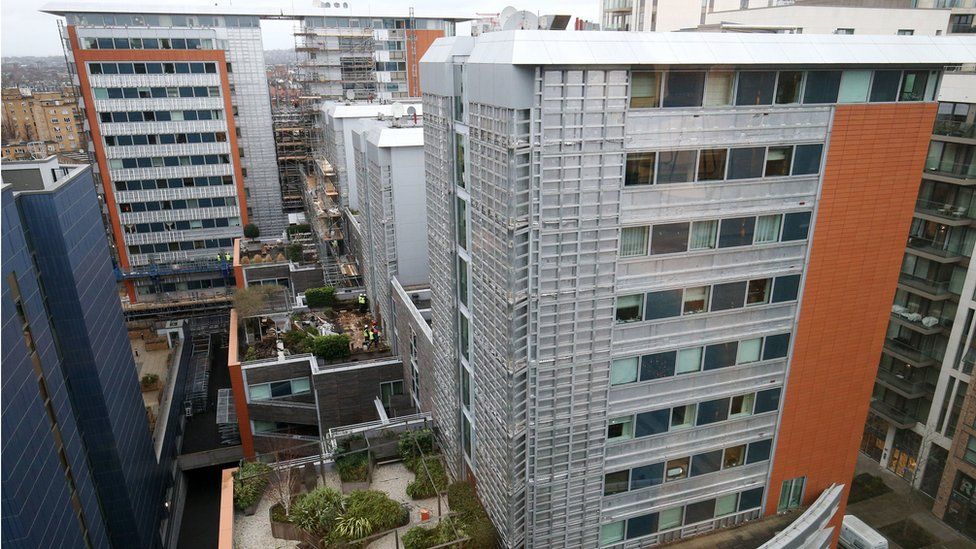
An extra £3.5bn has been promised by ministers to remove unsafe cladding from high-rise buildings over 18m high in England "at no cost to residents".
Many thousands of flat-owners face huge bills for fire-safety improvements, brought in after 2017's Grenfell Tower fire when flames spread via combustible cladding, killing 72 people.
Housing Secretary Robert Jenrick said it was the "largest ever government investment" in building safety.
Labour said it was "too late for many".
Mr Jenrick also announced:
- Owners of flats in lower-rise blocks would have access to loans to replace unsafe cladding - and would never have to pay more than £50 a month for them
- A new levy on developers of future high rises to cover the cost of grants
- A separate new tax on residential property development in the UK from 2022
Some residents said the measures did not go far enough and would leave many still living in dangerous buildings, facing impossible bills.
The £3.5bn comes on top of funding of £1.6bn that was announced for the removal of unsafe cladding last year.
Ministers have come under growing pressure to increase the pot as leaseholders have been hit by building improvement costs and soaring insurance costs.
Some say they have effectively become trapped in their own homes - unable to sell until the work is carried out, yet in danger of bankrupting themselves to meet the costs.
Housing Secretary Robert Jenrick told the Commons leaseholders in high-rise buildings above 18m, or with six storeys or more, would face no costs for cladding works.
He said the risk was "significantly lower" for lower-rise blocks of flats.
However, where cladding needed to be removed, Mr Jenrick announced a long-term scheme to protect leaseholders which would mean no leaseholder would pay more than £50 a month for the removal of unsafe cladding.
He also said a new levy would be placed on future developments.
It "cannot be right the costs fall solely on tax payers", he said, adding that the government would develop a levy targeted at developers seeking to build certain high-rise buildings in England.
He also said a new tax for the UK residential property sector would be introduced from next year, to raise £2bn over a decade and help pay for the removal of cladding.

Mr Jenrick described the action as an "unprecedented intervention" without which building owners would simply pass on the costs of remediation work to leaseholders.
"That would risk punishing those who have worked hard, who have bought their own home, but through no fault of their own have found themselves caught in an absolutely invidious situation," he said.
The Home Builders Federation, a trade association for private sector homebuilders, said it supported "sensible" solutions for recouping costs and was looking forward to working with the government on an "equitable" tax that did not "threaten housing supply".
'Financial ruin'
Conservative MP Stephen McPartland, a critic of the government's handling of the cladding crisis, said Mr Jenrick's announcement did not go far enough and the issue was much bigger than the matter of cladding.
"The support he has offered does not help most people because people who've got excessive insurance premiums, fire safety defects - that's where the real costs are," he told BBC Radio 4's World at One.
"Leaseholders are the innocent parties in this. Many people were in primary school when these buildings were constructed and they're now being hit with bills that will be bankrupting them."
Labour's shadow housing secretary, Thangam Debbonaire, called the proposals "an injustice" that would "pile financial misery" on homeowners.
She said there were many questions left unanswered, including on "skyrocketing" insurance costs, homes potentially remaining "unsellable", and the amount leaseholders would be expected to pay.
The "arbitrary 18m-height limit" could "mean the difference between a safe home and financial ruin", she said.
Labour wants an independent taskforce to be established to take the matter out of politicians' hands and ensure funds are distributed fairly.
Rebecca Fairclough, from Manchester Cladiators, which represents 70 tower blocks with fire safety issues in the Greater Manchester area, said funding was needed to cover all building safety issues, not just cladding.
She said she was disappointed loans were the only solution on offer to those in buildings under 18m high.
"Millions of residents continue to live in dangerous buildings, facing impossible bills and with their mental health deteriorating daily," she said.
"They hoped today's announcement would give them some hope - but it doesn't," she said.
Natasha Letchford, a campaigner for the End Our Cladding Scandal group, said the funding was far short of the estimated £15bn bill to fix all the issues.
She said as long as there were outstanding bills on properties, they would be worthless and people simply would not want to buy them.

Do you live in a building with unsafe cladding? Are you a leaseholder who will be affected by the 18m rule? Share your experiences by emailing haveyoursay@bbc.co.uk.
Please include a contact number if you are willing to speak to a BBC journalist. You can also get in touch in the following ways:
- WhatsApp: +44 7756 165803
- Tweet: @BBC_HaveYourSay
- Upload pictures or video
- Please read our terms & conditions and privacy policy
If you are reading this page and can't see the form you will need to visit the mobile version of the BBC website to submit your question or comment or you can email us at HaveYourSay@bbc.co.uk. Please include your name, age and location with any submission.
https://news.google.com/__i/rss/rd/articles/CBMiJmh0dHBzOi8vd3d3LmJiYy5jby51ay9uZXdzL3VrLTU2MDEzNDY00gEqaHR0cHM6Ly93d3cuYmJjLmNvLnVrL25ld3MvYW1wL3VrLTU2MDEzNDY0?oc=5
2021-02-10 14:50:00Z
52781364631055
Tidak ada komentar:
Posting Komentar